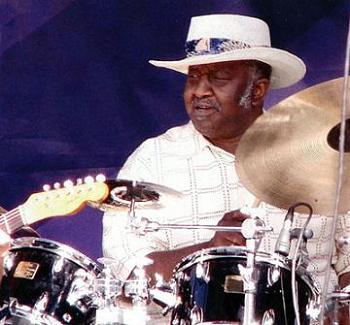
 : : Great drummers
: : Great drummers
- Acuña Alex
- Agostini Dante
- Alexander Tim "Herb"
- Allen Tony
- Ameen Robby
- Appice Carmine
- Aronoff Kenny
- Arpino Thierry
- Barretto Ray
- Belleville Pierre
- Bellson Louie
- Bissonette Gregg
- Blackwell Ed
- Blaine Hal
- Blakey Art
- Bonham John
- Bozzio Terry
- Brown Carlinhos
- Brown Gerry
- Bruford Bill
- Carrington Terri Lyne
- Ceccarelli André
- Cerrone Marc
- Chambers Dennis
- Cinelu Mino
- Clarke Kenny
- Cobham Billy
- Colaiuta Vinnie
- Collins Phil
- Conte Luis
- Copeland Stewart
- Da Fonseca Duduka
- de Grasso Jimmy
- de Johnette Jack
- Diabaté Inza
- Diaz Miguel "Anga"
- Dodds Warren "Baby"
- Donati Virgil
- Dunbar Lowell “Sly”
- Erbetta Marc
- Erskine Peter
- Escovedo Sheila "E"
- Ewandé Louis César
- Fanfant Jean-Philippe
- Foster Al
- Gadd Steve
- Garibaldi David
- Gastaldin Claude
- Gonzalez Jerry
- Gozzo Alain
- Greer Sonny
- Grohl Dave
- Guem
- Gurtu Trilok
- Gustke Ralf
- Hakim Omar
- Haynes Roy
- Hernandez “El Negro” Horacio
- Hidalgo Giovanni
- Higgins Billy
- Hoglan Gene
- Humair Daniel
- Hussain Zakir
- Jacquin Jean-Christophe
- Jimbo Akira
- Jones Elvin
- Jones "Philly" Joe
- Jones « Papa » Jo
- Jordison Joey
- Katché Manu
- Keita Mamady
- Kolinka Richard
- Krupa Gene
- Lake JR Oliver Gene
- Lang Thomas
- Latham Rick
- Mac Brain Nicko
- Mason Harvey
- Mattalia Alessia
- Mayer Jojo
- Michelino Silvano
- Minnemann Marco
- Mitchell John "Mitch"
- Mocidade Independente de Padre Miguel
- Moeller Sanford
- Moreira Airto
- Morello Joe
- N'Diaye Rose Doudou
- Oxley Tony
- Paice Ian
- Paolini Jean-Claude
- Parker Leon
- Peart Neil
- Phillips Simon
- Poleo Orlando
- Porcaro Jeff
- Portnoy Mike
- Pozo Chano
- Priester Aquiles
- Puente Ernesto « Tito »
- Purdie Bernard "Pretty"
- Quintana Jose Luis "Changuito"
- Rekow Raul
- Renaudin Bertrand
- Rich Buddy
- Roach Max
- Roddy Derek
- Samba Mokhtar
- Sanchez Poncho
- Santamaria Mongo
- Séry Paco
- Smith Chad
- Smith Marvin “Smitty”
- Smith Steve
- Sorum Matt
- Starr Ringo
- Stewart Bill
- Stubblefield Clyde
- Temiz Okay
- Terrana Mike
- Top Secret Drum Corps Basel Suisse
- Ulrich Lars
- Vander Christian
- Wassy Brice
- Watts Charlie
- Watts Jeff
- Webb Chick
- Weckl Dave
- White Lenny
- Wilk Brad
- Williams Tony
- Ziad Karim
Purdie Bernard "Pretty"
Musicians or bands:
Aretha Franklin, Dizzy Gilespie, Miles Davis, Louis Armstrong, Herbie Mann, Nina Simone, James Brown, Marvin Gaye, Gato Barbieri, Jackson Five, B.B. King, Paul Simon, Steely Dan, Joe Cocker, Larry Corryell
Biography and commentary:

Born in 1939, Bernard "Pretty" Purdie is a pioneer drummer in the fusion of blues style, funk, Rythm'n'blues and jazz (evidenced by the prestigious list of artists with whom he worked). He started playing the drums at 14 years old in the carnival and country bands, and performed in New York in 1960, but it was not until 1970 that he really makes himself known alongside a "star": Aretha Franklin, which propels his studio drummer career after playing with many luminaries of jazz and blues. He is famous for a style of playing now called the "Purdie shuffle", which consists in introducing a flow of embellishments (ghosts notes, shuffle with the four limbs, playing with alternating strokes, roll, chabadas, etc.) around a beat and afterbeat in two beats of the most simple. The subdivision of each beat in 9 equal beats (triplets of triplets, what I call the "double swing" (examples: "It's a man's man's man's world", James Brown, 1966, "Nina Simone Sings the Blues", 1967)) for the "very slow blues" could be one of his inventions as well as the "half time shuffle" (division of each beat in 6 with two triplets groups, or "swing rock" ("Coffee Cold" album "Shapes of Rhythm", Galt MacDermot, 1966)). His shifts in 3 over 4 on ride cymbal (in mixed sticks and in the spirit of New Orleans or even samba) inspired surely David Garibaldi and Jack DeJohnette. The pioneers of heavy metal such as John Bonham, Carmine Appice and Ian Paice, and jazz-rock and progressive rock as Mitch Mitchell and Ringo Starr was probably inspired by his playing (Bernard was also perhaps in turn inspired by Mitch Mitchell, unless all these drummers have had the same avant-gardist ideas almost simultaneously). Contemporary drummers like Steve Gadd, Jeff Porcaro or Dennis Chambers, owe him a lot. His style combining clarity and discreet complexity, earn him to be appreciated by musicians from the most popular to the most sophisticated, to be one of the most recorded drummers in history (over 3,000 albums!) and copied by all the best current drummers of blues and R & B (or even pop, jazz-rock and metal), demonstrating the avant-gardism of his playing.
Marc De Douvan, publication in French: November 22, 2006 (for the translation in English: July 12, 2015)
Official website
SeeLink to Drummerworld or other
See© 2005 Marc de Douvan Crédits Mentions légales
